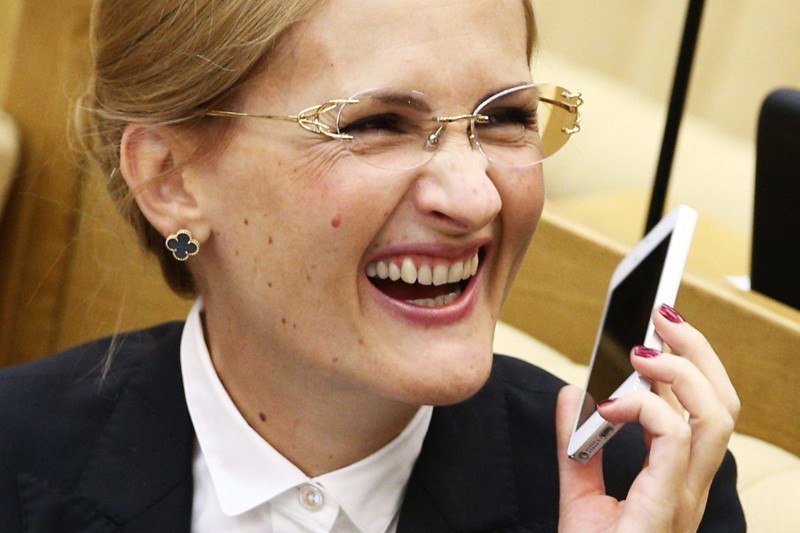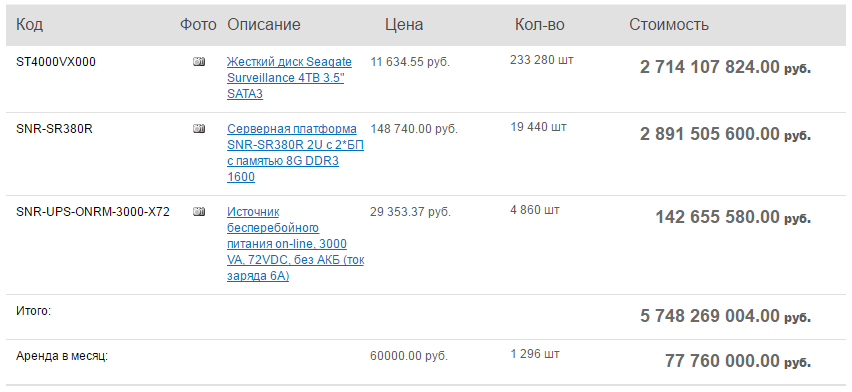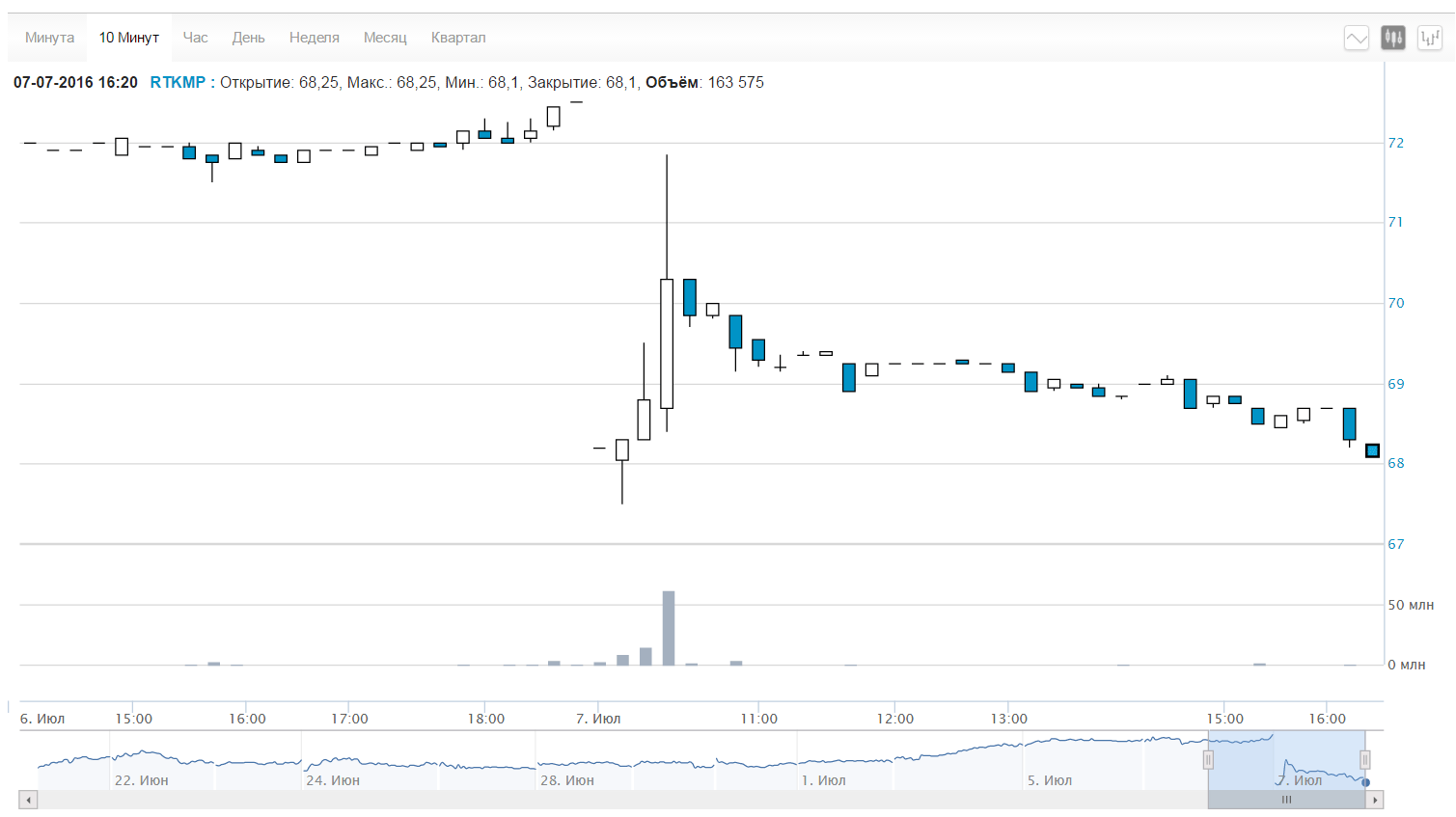It did happen: Putin signed the “Spring package.” Communication tariffs will grow 2-4 times

MP Irina Yarovaya. Photo: Stanislav Krasilnikov / TASS
Today, the President of the Russian Federation signed the Yarovaya-Ozerov package, adopted by the Parliament and the Council of the Federation, with amendments to Russian legislation , including amendments to the Law on Communications. Thus, the final point was put in the discussion of this package, which was discussed in detail at Habré.
The package of new laws obliges telecom operators to store metadata and up to six months traffic for up to three years.
')
According to the adopted laws, the infrastructure for wiretapping of the population will be paid by the population itself , most likely due to an increase in communication tariffs and a decrease in the profit margin of operators. How much will the prices for communication increase? Here, expert opinions differ.
What will be stored
Telecom operators and organizers of information dissemination on the Internet are required to store up to six months all user traffic - text messages, voice information, images, sounds, video, and other electronic messages. (Under current legislation, operators are not required to record and store user traffic)
Telecommunications operators are obliged to store metadata for three years - information on the facts of reception, transmission, message delivery and calls. Internet providers are required to store such information for one year. (Under current legislation, operators are obliged to store information only about the facts of the connection and only six months)
There is an important clause in the adopted draft law : the procedure, timing and amount of storage of the information specified in this sub-paragraph are established by the Government of the Russian Federation .
Thus, the final decision to store all traffic for six months has not yet been made: “It could be 12 hours, it could be 24 hours,” explained Irina Yarovaya. “The law does not regulate this issue at all, the law establishes only the powers of the government to define it, and we limit the government in its expression of will.”
The traffic storage norm takes effect on July 1, 2018.
Amount of information

Obviously, when calculating the total volume of stored information, we can neglect the volume of metadata. There are text records with numbers, IP-addresses and other technical information, the amount of which is incomparably small compared to the recording of voice traffic and Internet traffic.
MTS calculated the amount of data, including calls and SMS, equal to about 5-6 million TB per year.
VimpelCom estimated storage volume at 705.8 billion minutes of voice calls, 39 billion SMS, 8.6 million TB of data.
Megafon - about 700 billion minutes, 50 billion messages and 6 million TB of traffic.
If you calculate the storage volume of only conversations, then Beeline will have about 10 exabytes in six months without compression, and 9 exabytes in Tele2 (based on 1 MB for 10 minutes, without compression).
Russian developers are now offering service providers to install a domestic voice compression system, which compresses 1.5 hours of voice recording into 1 megabyte , which reduces the amount of stored information 9 times and significantly reduces costs.
Infrastructure cost: fiction
Estimates of experts and operators themselves about the cost of the project are very different. For example, according to the calculations of the operators , the three-year storage of the data laid down in the original text of the amendments would require from them an investment of 5.2 trillion rubles.
Reducing the data retention period from three years to six months reduces capital costs by more than two times. In this case, the infrastructure for storing data will cost 2.2 trillion rubles .
According to Mail.ru Group estimates , one-time capital expenditures for the project will amount to $ 1.2–2 billion. Additional transaction costs each year will be approximately $ 80–100 million. Another $ 35–40 million will be needed to refine the software that is needed to store user information. . It will take 3-5 years.
According to Mail.ru Group, an additional 4,500 racks in data centers will be required to store information. The minimum construction period of such a data center is 3-4 years.
"Rambler" estimated that the company's expenses will double.
Yandex found it difficult to estimate the costs.
The representative of VimpelCom estimated the creation of the entire system of collecting, identifying and storing information at about 2 trillion rubles, and the costs of each operator (including himself) at least 200 billion rubles. Such an assessment was made on the basis of the initial requirement to keep traffic for three years, rather than six months (the amendment was made for the second reading of the bill).
Megafon estimated the cost of building data centers at 230 billion rubles.
MTS estimated the cost of building data centers, equipment, maintenance and other expenses at 2.2 trillion rubles.
Deputy Spring said on the TV channel "Russia 24" that there is "no reason to increase the cost of communication services," and the final storage period for data by telecom operators will be set by the government.
The co-author of the package of laws, Senator Victor Ozerov also called the statements of the operators "emotional and unsupported calculations." Such an opinion is quite natural for a person who does not know about the existence of the Tele2 operator in Russia, which indicates his level of competence.
Infrastructure Cost: Reality
The largest mobile operators MTS, Vimpelcom, Megafon and Tele2 warned in advance about the upcoming increase in communication tariffs. Of course, the specific framework for raising tariffs has not yet been called, as well as the time when the connection will be more expensive.
According to the plan, before November 1, 2016, the government and operators will clarify the schedule for the introduction of standards requiring costs from market participants, and, accordingly, the cost schedule. After that, the operators recalculate their forecasts and adjust tariffs.
First, let's calculate how much information the operators will have to store in the worst case, if the government sets a six-month data retention period. To do this, we use the convenient Yarkulyator , the Spring calculator, on the website of the Internet service providers portal NAG.ru. The calculator allows you to calculate the amount of accumulated data per month for a given bandwidth of the carrier, as well as the amount and cost of equipment required to store this amount of information, including the cost of hard drives, servers, UPS and rental racks for all this hardware.
With a channel width of 500 Gbit / s and a storage period of 6 months, the operator will need to store approximately 933,120 TB, these are 233,280 hard drives with 4 TB each, that is, 19,440 servers (12 hard drives per server), 1296 server racks (15 servers per rack ), 4860 uninterruptible power supplies.

Based on the cost of renting the rack 60 000 rubles. per month the total rental price will be 77,760,000 rubles.
Total estimate

In this calculation, you can still add the required total area of the room .
1296 posts with 0.8 m 2 each (800x1000) = 1036.8 m 2
Rent 400 rubles / m 2 / month = 414 720 rubles / month. or 4 976 640 rubles / year.
Hard drives and batteries to UPS have a lifespan of 5-10 years. The rest of the "iron" - a little longer. External channels are constantly growing, so that the number of racks will have to increase. Naturally, you need to add the cost of design work, replacement of hard drives, batteries, the salary of engineers, etc.
How much will rates increase?
Telecom operators believe that tariffs will have to increase by 2-3 times.
“At this stage it is difficult to predict the volume of growth, but it is obvious that costs can only be offset by the cost of communication services, other sources simply do not exist. Moreover, even if we operate with figures called Viktor Ozerov (42 billion rubles for the Moscow region for four telecom operators), even according to such “modest” calculations, the costs for the whole country for all operators will exceed 1 trillion. rubles. This cannot but affect the cost of communication services, ”said representatives of MegaFon.
The assessment of the head of the Ministry of Communications and Mass Media, Nikolay Nikiforov, is more pessimistic: communication services will rise in price four times.
According to the providers , traffic storage for mobile operators will cost an additional 500 rubles of equipment costs for each subscriber, plus overhead costs. Now the owners of smartphones in Russia pay about 500 rubles a month for communication services (users of regular phones have 176 rubles less).
Russian telecom operators have one of the lowest ARPU in the world . Russian users pay for the connection is ridiculously small compared with other countries. It is possible that the authorities decided that raising the tariffs several times would not be too heavy a burden for the Russians.
According to Yandex , the average for Russian providers, the rate of the cheapest tariff without traffic restrictions with a stated speed of at least 3 Mbit / s - 404 rubles. That is, a preliminary estimate of the growth of tariffs by 2-3 times looks quite correct. In particular, the cheapest unlimited Internet can rise in price, on average, from 404 to 1008-1212 rubles. per month.
Shares of Russian operators
After the adoption of the package, the Spring Market practically did not react to this event. Obviously, Western investors did not believe that the amendments could really be adopted and would cause a serious financial blow to the Russian communications industry. Russian operators themselves didn’t believe this much: voicing fantastic cost figures (see above), none of the operators included Yarovaya’s package in the financial risk sections in the quarterly reports of companies published in May, when the bill was already discussed.
But now everyone has understood that the matter is taking a serious turn, although there is still no complete certainty that the authorities will put the operators to the end of the market.
Today, on the Moscow Stock Exchange, the value of Rostelecom ordinary shares fell by 4.5%, preferred shares - by 4.9%.


The cost of MTS ordinary securities immediately after the signing of the law by Putin fell by 3%.

The cost of shares of MegaFon decreased by 1.4%.
State control
In order to prevent mass manifestations of public discontent over the increase in tariffs, the government intends to tightly control telecom operators: “The government is charged with monitoring the implementation process and implementation of this law very precisely, in order to minimize possible risks associated with financial expenses, using domestic equipment for storing information, and so on, ”the presidential press secretary Dmitry Peskov explained today.
The expenses of companies on the creation of a technical system of wiretapping and data storage will contribute to capital expenditures, that is, investments in fixed assets with a payback of several decades. According to MTS , in such conditions, the company will not be able to pay income tax for 100 years.
If tariffs are not sharply raised during the 2016-2017 year, the profits of the operating companies will fall sharply or become negative. Perhaps it is this option that the government provides for in terms of “minimizing possible risks associated with financial expenses.” Tariffs should be increased smoothly, and companies will temporarily have to work at a loss. For users, this would be the best option, but even in this case, the growth of tariffs is inevitable.
An interesting option for financing the construction of state-owned data centers was offered by Sergey Soldatenkov, MegaFon CEO. He believes that if the state creates such data centers on its own and stores the traffic of all operators, then we will fulfill the plan. In this case, operators will pay tax to the state to finance the construction and maintenance of data centers.
Sergei Soldatenkov stressed that if the operators have to create the infrastructure on their own without the help of the state, then the state’s plan for total tapping is practically impossible.
Encryption Certification
Along with the signing of the package of amendments Spring, President Putin instructed the government to pay attention to the application of the provisions of the law “on liability for use on communication networks and (or) when sending messages to the information and telecommunications Internet network of non-certified encryption tools (encryption)” the development and maintenance by the authorized body in the field of ensuring the security of the Russian Federation of the register of organizers of information dissemination on the Internet, providing, upon request, x departments of information necessary for decoding received, transmitted, delivered and (or) processed electronic messages in the case of their additional encoding. "
The Federal Security Service has been instructed to approve the procedure for certifying the means of encoding when transmitting messages on the Internet, to determine the list of means to be certified, as well as the procedure for transferring the encryption keys to the authorized body in the area of state security.
In other words, along with the storage of all the traffic, the security services want to solve the encryption problem - make sure that, if necessary, they will be able to get the keys and decrypt the HTTPS traffic without understanding the technologies .
PS Edward Snowden called July 7, 2016 a black day for Russia .
UPD . Organized the collection of signatures for the public initiative number 36F28432 on the abolition of the package of amendments Spring.
Source: https://habr.com/ru/post/395771/
All Articles